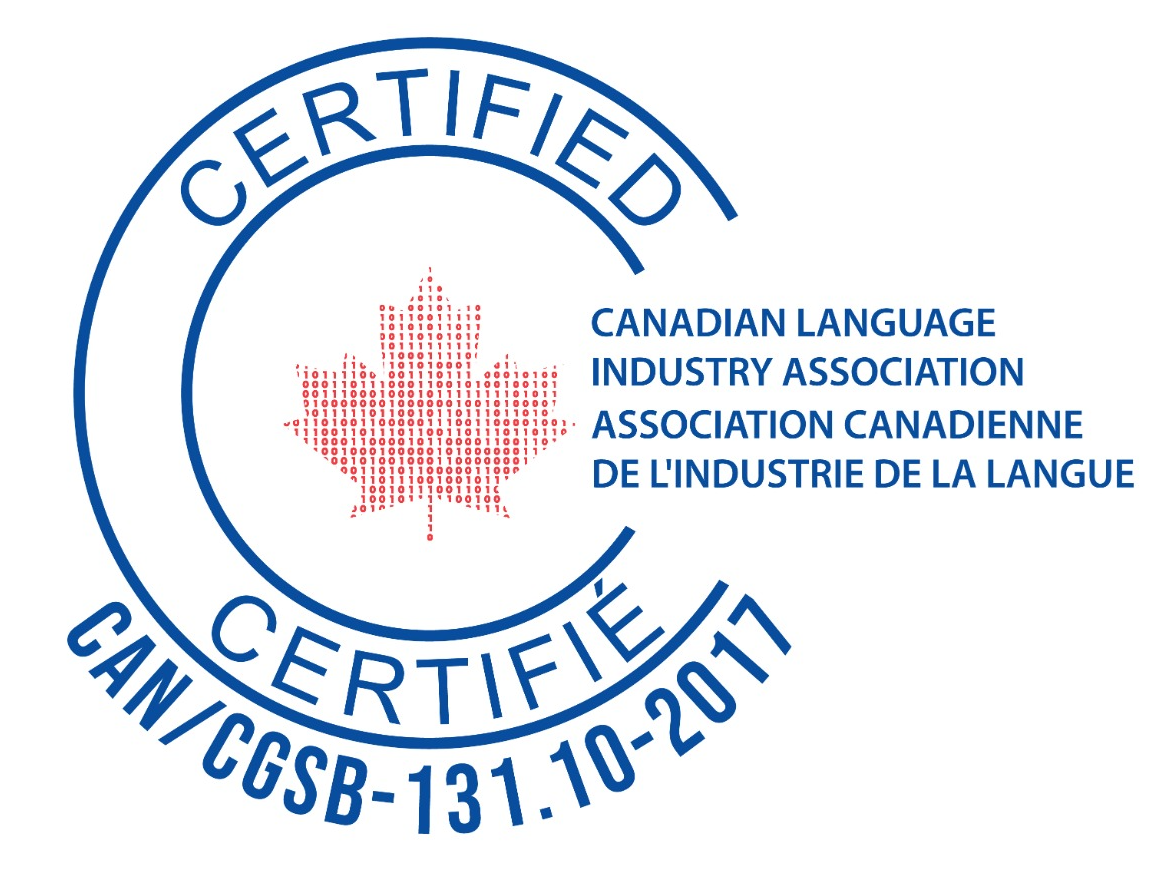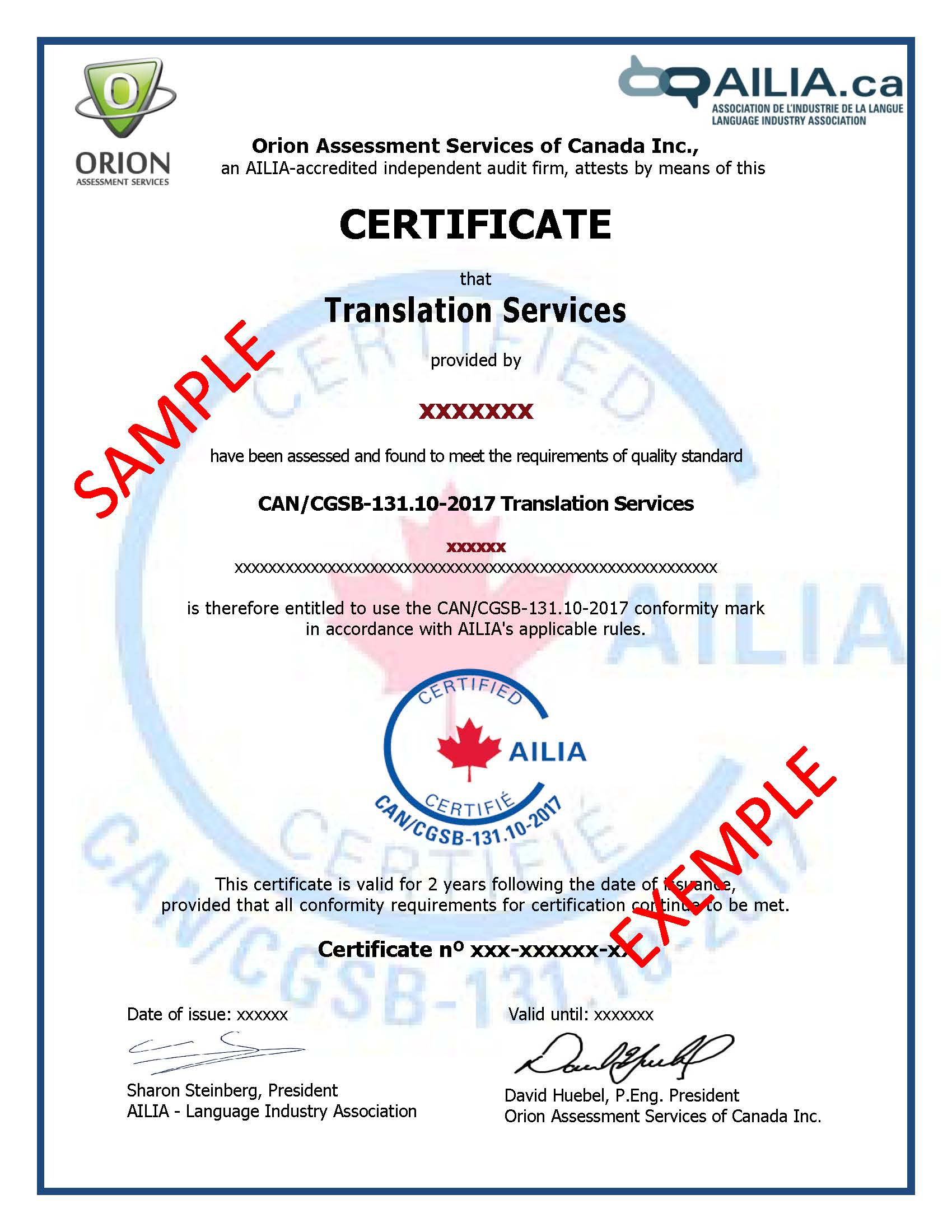Home > Certifications and Standards > CGSB-131.10
National Standard for Translation Services
Certification for CAN/CGSB-131.10-2017, Translation Services Standard
LEVEL THE PLAYING FIELD AND PROTECT YOUR CLIENTS
 The National Standards of Canada for Translation Services CAN/CGSB-131.10 -2017 is available at no cost.
The National Standards of Canada for Translation Services CAN/CGSB-131.10 -2017 is available at no cost.
You can download CGSB standards from the Government of Canada Publications website.
CAN CGSB 131.10 – 2017 English and French
Current certification is based on CAN/CGSB-131.10-2017, Translation Services, a national standard developed by the Canadian General Standards Board and approved by the Standards Council of Canada. The first edition was published in 2008. It involved the participation of representatives from the Canadian Language Industry Association (formerly AILIA), professional associations, government, education, clients, and other stakeholders.
Certified companies can use the certification in marketing efforts, both in Canada and abroad. Certification will reassure your clients that your organization, whether small or large, complies with the processes required by the standard.
Canadian Language Industry Association certification offers a number of benefits to translation service providers:
- Quality
- Improved service performance
- Credibility
- Consistency
 Improved and well-organized workflows
Improved and well-organized workflows- Protection to service providers, users, individuals, and the public
- Clearer processes and procedures
- Clarity regarding roles
- Reliable commercial relationships
- Added value
- Unification of terminology in the sector
- Methodology to ensure customer satisfaction, a system to identify non-compliance
- Risk management
- Marketing – a unique selling proposition
Gain Certification
The Canadian Language Industry Association contracted the services of Orion Assessment Services of Canada, recognized auditors with respect to ISO, CEN, and other standards to conduct audits, to ensure professionalism and complete confidentiality for all applicants. All transactions are held directly with the selected auditing firm to ensure that your information is protected and to guarantee impartiality. Once each audit has been completed, Orion will request that the Canadian Language Industry Association issue a certificate to firms who have been granted certification under CAN/CGSB-131.10-2017.
Maintenance assessments are performed by Orion Assessment Services every two years. This assessment follows the same procedure as the first, with all of the same questions and the same checklist. Applicants must be Corporate members in good standing for the continuous two year period prior to the maintenance assessment.
To learn more about the certification (process, rates, and requirements), visit Get Certified page.
Explore the National Standards for Translation Services
The National Standard of Canada, CAN CGSB 131.10-2017 establishes and defines the requirements for the provision of translation services by translation service providers (TSPs). The standard is applicable to organizations as well as individuals providing the translation services described. The standard does not apply to interpreting or terminology services.
The initial 2008 National Standard of Canada was a based on the European Committee for Standardization (CEN) standard EN 15038 Translation Services. The document was prepared with the intent to harmonize where possible with the provisions of EN 15038 Translation Services. Variances in wording and content with EN 15038 reflect the Canadian perspective.
The technical committee that created the CAN CGSB 131.10 had multiple stakeholder representation from industry, government, academia, professional orders and consumers alike. The committee followed a strict process as established by the Canadian General Standard Board and the Standards Council of Canada.
Conformity assessment and certification based on this standard are already in place.
On the premise that translation service providers are an essential component in assuring the quality of translation, the Canadian Language Industry Association supports the most advanced translation standard certification in the world. This represents a cornerstone of the Association's commitment to create a healthier translation sector in Canada and to position the Canadian industry strategically in the global translation market.
Compliance with the CAN/CGBS-131.08-2017 standard affirms for the client that the provider has passed an independent audit, and thus adheres to the highest level of service. The Canadian Language Industry Association believes all translation service providers ought to be able to demonstrate proof of competency and recommends that any purchaser of translation services insists on conformity with national standards.
The national standards apply to:
Human Resources
- Translation service providers are to follow documented procedures when selecting individuals for each project and ensure the competencies and education/experience of all translators, revisers and reviewers.
Technical Competencies
- Including electronic data storage, archiving and disposal, word processing, computer-assisted translation tools, research tools, safe handling, and familiarity with hardware/software and information sources/media.
Quality Management System
- Implementation of statement of objectives, handling process for client information/documentation, human resources qualification process, terminology process and databases, quality assurance and follow-up/corrective action.
Client-Service Provider Relationship
- Documenting procedures for feasibility analysis, quotations, availability of human and technical resources, agreements, invoicing and recording.
- Identifying the client's role/responsibilities, source text, target audience, quality assurance, confidentiality, deadlines, deliverables, pricing and terms of payment and termination.
- Defining terminology, copyright and liability issues, dispute settlement, handling of client’s documentation, special requirements.
Translation Service Provider Project Management Procedures
- Client requirements, SOWs, project management, assigning of translators/revisers/reviewers and technical resources, monitoring, timetables, updating client.
- Compliance with client-service provider agreements, maintaining client project-specific log, selecting appropriate personnel as per project requirements.
- Technical resources / pre-translation processing / linguistic aspects.
Translation Process
- Relevant references, documents, information regarding source text.
- Compliance with similar and concurrent projects.
- End-users / target audience and purpose.
- Local conventions, regional standards.
- Syntax, spelling, punctuation, grammar, terminology, lexicology, style, formatting.
- Specific domain and client terminology.
- Applicable style guides.
- Checking, revision, review, and final proofreading.
